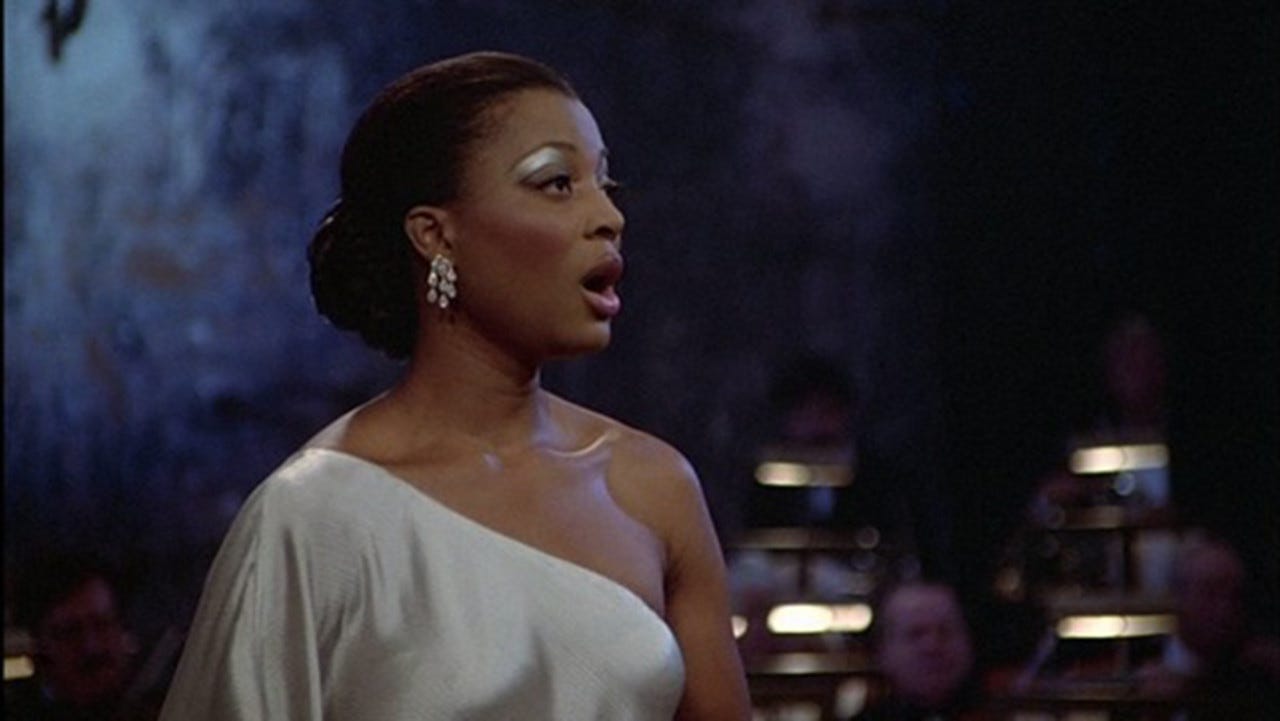Aria
On Jean-Jacques Beineix's Diva
Diva begins in fandom. When Jean-Jacques Beineix’s 1981 film opens, its hero Jules (Frédéric Andréi), a young Paris postman who makes his rounds zipping around the city on his moped, is in the third row at a recital by the American soprano Cynthia Hawkins (Wilhelminia Wiggins Fernandez). Cynthia’s concerts are events because she refuses to record. “Music comes and goes,” she tells yet another reporter trying to get her to justify her stance, “don’t try to keep it.” (Cynthia is the anti-Glenn Gould, who gave up live performance in 1964 because he believed the studio allowed him to achieve the perfection he couldn’t in concert.) Jules is devoted to Cynthia, having followed her all over Europe on his bike, and even before she sings a note, the movie makes us understand his devotion. At the first glimpse of Fernandez, her beauty simply knocks you flat. Cynthia comes on stage clad in a satiny off-the-shoulder white gown that sets off her ebony skin, her enormous eyes taking in seemingly every detail in the room. For someone willing to trust her gift to the unpredictability of live performance, Cynthia seems in complete control of the environment. She basks in the audience’s welcoming applause and then, as she looks down to collect herself, shuts them out. When she feels it’s time to begin she signals the conductor with not even the merest nod but a look. She’s the one in charge here.
Except that she isn’t. Two shady Taiwanese operators (they don’t take off their mirrored aviator glasses for the entire movie) have noticed that Jules is surreptitiously recording the recital on his high-end portable tape recorder, and they’re determined to get their hands on the tape and the millions that will ensue. For a fan to do this is a violation, but when you hear Fernandez sing you can’t blame Jules for wanting to preserve it. The aria he captures is “Ebben? Ne andrò lantana” from Act One of Catalani’s La Wally. The movie doesn’t provide subtitles. You wouldn’t want them. You don’t want an experience like this explained any more than you’d want to know what “I Am the Walrus” or “a wop bop a loo bop a lop bam boom” mean. You’re already lost in Fernandez’s beauty and now you’re lost in her voice. Beineix and his cinematographer Philippe Rousselot position the camera just close enough to Fernandez so you can see each word forming on her lips, and the effect as if this aria hasn’t been written but that the singer is giving birth to it syllable by syllable. The sound is round and rich, hitting low notes and still sounding round and rich when her voice soars to majestic high ones. When, at the climax, Fernandez cuts it off after a breathtaking crescendo, you feel both like you can breathe again and that everything in you is clamoring for more. Presumably, Cynthia’s concert goes on after this and yet you wonder how. What could possibly follow it? It’s very likely that in this one scene the combination of Fernandez’s charisma and the beauty of her voice may have done more than anything in the movies to make people who say they don’t like opera understand how it can overwhelm you. (I know one man who claimed he didn’t like opera and fell in love with Fernandez the instant he saw her.)
Keep reading with a 7-day free trial
Subscribe to Crackers in Bed to keep reading this post and get 7 days of free access to the full post archives.


